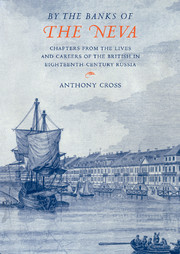 'By the Banks of the Neva'
'By the Banks of the Neva' Book contents
- Frontmatter
- Contents
- List of illustrations
- Preface
- Note on Russian dates
- Introduction
- 1 The colony by the banks of the Neva
- 2 Factory matters and ‘the honourable of the Earth’
- 3 ‘In Anglorum templo’: the English Church and its chaplains
- 4 ‘Doctors are scarce and generally Scotch’
- 5 ‘Sur le pied anglais’: shipbuilders and officers in the Russian navy
- 6 ‘Necessary foreigners’: specialists and craftsmen in Russian service
- 7 Masters of the Arts
- 8 ‘Out of curiosity’: tourists and visitors
- Epilogue
- Notes
- Index
4 - ‘Doctors are scarce and generally Scotch’
Published online by Cambridge University Press: 15 December 2009
- Frontmatter
- Contents
- List of illustrations
- Preface
- Note on Russian dates
- Introduction
- 1 The colony by the banks of the Neva
- 2 Factory matters and ‘the honourable of the Earth’
- 3 ‘In Anglorum templo’: the English Church and its chaplains
- 4 ‘Doctors are scarce and generally Scotch’
- 5 ‘Sur le pied anglais’: shipbuilders and officers in the Russian navy
- 6 ‘Necessary foreigners’: specialists and craftsmen in Russian service
- 7 Masters of the Arts
- 8 ‘Out of curiosity’: tourists and visitors
- Epilogue
- Notes
- Index
Summary
The observation that doctors in Russia were ‘scarce and generally Scotch’ appeared in a book of travels published by one John Richard in London in 1778. The fact that the book was apparently the production of an armchair traveller whose knowledge of Russia would seem to have been limited to the superficial perusal of other people's accounts and conversations with visiting Russians increases rather than minimises the interest of the remark. If Richard were reflecting British opinion about the state and composition of the Russian medical services, then that opinion reveals its usual compound of half-truth and fiction. Doctors, virtually all foreigners before the reign of Catherine II, were indeed scarce in Russia; the majority of them were German, however, and only a small minority British, of whom the most prominent and visible were indeed Scots. But it was not so in pre-Petrine Russia.
Within four years of Richard Chancellor's unsought visit to Moscow in 1553 there arrived the first English physician to practise at the Russian court. What precisely prompted Richard Standish to accompany the returning Russian ambassador, Osip Nepeia, is unknown, although several other Englishmen, including an apothecary Richard Elmes, were also attracted by the inducements offered. Certainly, they were royally treated by Ivan IV and it is recorded that ‘there were given unto master Standish doctor in Phisick, and the rest of our men of our occupations, certaine furred gownes of branched velvet and gold, and some of red damaske, of which master Doctors gowne was furred with Sables’. Standish had little time to enjoy his good fortune or to incur imperial wrath, for he died in 1559, less than two years after his arrival in Russia.
- Type
- Chapter
- Information
- 'By the Banks of the Neva'Chapters from the Lives and Careers of the British in Eighteenth-Century Russia, pp. 121 - 158Publisher: Cambridge University PressPrint publication year: 1996


